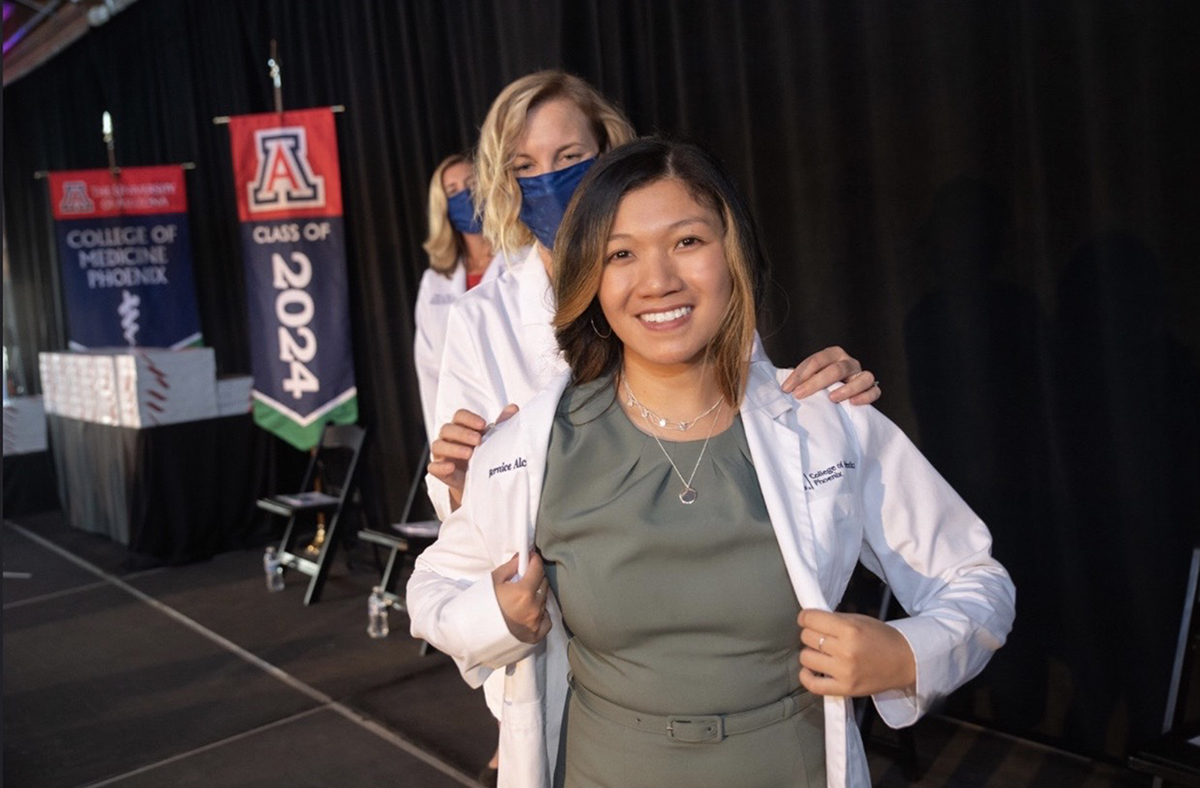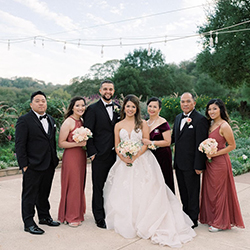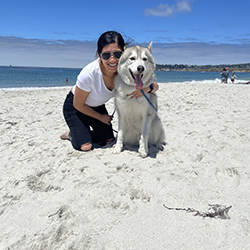
Match Day Profile: Bernice Alcanzo

Every third Friday in March, fourth-year medical students across the United States learn where the next chapter in their careers will be written. Match Day is the day when the National Resident Matching Program releases results to applicants in sealed envelopes, revealing where they will spend the next several years in residency, training in their chosen specialty. After years of preparation and study, it is a long-awaited and well-deserved day to celebrate. The University of Arizona College of Medicine – Phoenix is profiling several students for Match Day 2024.
Meet Bernice Alcanzo
Originally from the Philippines, Bernice Alcanzo’s family moved to Maryland for her mom’s job as a special education teacher. After graduating Stevenson University in Maryland, Alcanzo moved to Arizona to work for a lab and as a case manager for the Arizona Department of Child Safety.

She pivoted toward a career in medicine when she was admitted into Pathways Scholars at the University of Arizona College of Medicine – Phoenix in 2019, matriculating into medical school the following year.
Alcanzo credits her family as being her biggest champions. They are constantly cheering her on. Her friends have also gone above and beyond to support her.
Path Toward Medicine
What was the spark that led you to become a physician?
My interest in medicine started when I was about eight years old, when my youngest sister was born with cardiac defects and spent quite some time in the NICU before being discharged home.
She went on to live healthily and without any issues until she was 10 when she passed away from a ruptured brain aneurysm. This experience solidified my desire to pursue a career in medicine.
Choosing a Specialty
Do you have a specialty? What is it and why did it interest you, or what led you to it?
I am going to be a urologist! Urology is a surgical specialty that deals with the male and female urinary tract as well as the male reproductive organs. I loved the idea of managing a variety of conditions, from improving quality of life to treating malignancies and being able to see patients long-term.
After scrubbing in on a pediatric urology case, I wanted to learn more about the specialty, so I did an elective during my third year. Working with urologists made me realize that I found the people who I want to work with daily.
They are some of the kindest and funniest doctors. Urology patients are also often so grateful and happy, and I feel incredibly privileged to be able to continue working with them.
What’s Next
Post-Match Day, what are your goals moving forward?
Urology does an early match, and I matched at the University of Arizona in Tucson! I rotated there last year, and I was so impressed with the quality of training. I also loved working with the residents and attendings there.

The College of Medicine – Phoenix Culture
What will you miss most about the College of Medicine – Phoenix? Any advice for incoming medical students?
I will miss seeing my friends the most. I’ve had the privilege of meeting future doctors whom I would trust to care for my family members.
My advice for incoming medical students is to be very intentional with your time these next four years. So much of your time will be spent studying, so when you aren’t, do what makes you happy — hike, cook, spend time with family, friends and your dog!
About the College
Founded in 2007, the University of Arizona College of Medicine – Phoenix inspires and trains exemplary physicians, scientists and leaders to advance its core missions in education, research, clinical care and service to communities across Arizona. The college’s strength lies in our collaborations and partnerships with clinical affiliates, community organizations and industry sponsors. With our primary affiliate, Banner Health, we are recognized as the premier academic medical center in Phoenix. As an anchor institution of the Phoenix Bioscience Core, the college is home to signature research programs in neurosciences, cardiopulmonary diseases, immunology, informatics and metabolism. These focus areas uniquely position us to drive biomedical research and bolster economic development in the region.
As an urban institution with strong roots in rural and tribal health, the college has graduated more than 1,000 physicians and matriculates 130 students each year. Greater than 60% of matriculating students are from Arizona and many continue training at our GME sponsored residency programs, ultimately pursuing local academic and community-based opportunities. While our traditional four-year program continues to thrive, we will launch our recently approved accelerated three-year medical student curriculum with exclusive focus on primary care. This program is designed to further enhance workforce retention needs across Arizona.
The college has embarked on our strategic plan for 2025 to 2030. Learn more.